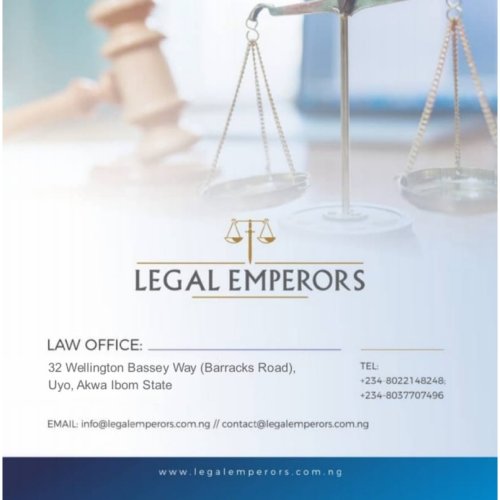Best Land Use & Zoning Lawyers in Uyo
Share your needs with us, get contacted by law firms.
Free. Takes 2 min.
Free Guide to Hiring a Real Estate Lawyer
List of the best lawyers in Uyo, Nigeria
About Land Use & Zoning Law in Uyo, Nigeria
Land Use & Zoning Law in Uyo, Akwa Ibom State, Nigeria, falls under the national Land Use Act of 1978, which uniformed land administration across the country. This law vests all land within the state's territory in the state governor to hold in trust for the people. The objectives of land use and zoning regulations are to ensure the most efficient use of land, to improve the welfare and environment for Uyo residents, and to manage development in a controlled and orderly fashion. Therefore, regulations and plans are in place to dictate how land can be used, determining what structures can be built where, and how property can be developed or modified.
Why You May Need a Lawyer
There are several scenarios where legal representation becomes essential in land use and zoning matters. These include when you are seeking to obtain or contest a zoning permit, when there is a need to comply with land use regulations, or when you are appealing a zoning decision or variance. Lawyers can also be valuable when drafting land use agreements, navigating eminent domain proceedings, or dealing with environmental restrictions. Additionally, if you're involved in land acquisition or disposition, or if there's a dispute over property boundaries or land rights, having a lawyer with expertise in land use and zoning can be incredibly advantageous.
Local Laws Overview
Local laws in Uyo pertaining to land use and zoning include zoning ordinances, building codes, and environmental restrictions. The Uyo Urban and Regional Planning Law provides a framework for spatial and physical planning within the city. This includes the preparation and implementation of the Master Plan, structure plans, and local plans. The Uyo Capital Development Authority (UCDA) is tasked with various responsibilities, including issuing construction permits, supervising uses of urban land, and ensuring compliance with designated zoning laws. It's essential to be familiar with these laws to understand how they affect property development and use in Uyo.
Frequently Asked Questions
Q1: How do I apply for a building permit in Uyo?
A1: You must submit an application to the Uyo Capital Development Authority (UCDA) along with the required documentation, including plans, site analysis reports, and stakeholder consent forms, as applicable.
Q2: Can I appeal a zoning decision?
A2: Yes, if a decision by a zoning board is not in your favor, you have the right to appeal. A lawyer could guide you through the appeal process.
Q3: What is a 'zoning variance'?
A3: A zoning variance is an exception to the current zoning laws granted by the local authority, allowing a property to be used in a way that deviates from the prescribed zoning regulations.
Q4: How long does it take to get a zoning permit in Uyo?
A4: The processing time can vary widely depending on various factors. It is best to inquire directly with UCDA for an estimated timeframe.
Q5: What are the consequences of not complying with zoning laws?
A5: Non-compliance can lead to penalties, including fines, orders to cease construction, or removal of unauthorized structures.
Q6: Can land use and zoning laws change?
A6: Yes, land use and zoning laws can be amended to accommodate new development needs or changes in policy. These changes may affect property values and permissible uses.
Q7: Do I need a lawyer to buy property in Uyo?
A7: While not mandatory, it's highly recommended to involve a lawyer to ensure there are no legal complications, especially relating to land use and zoning.
Q8: How do environmental regulations affect land use in Uyo?
A8: Environmental regulations are established to protect the ecosystems and public health, which can impose limitations on the use and development of land.
Q9: Are there any zoning laws specifically for residential properties?
A9: Yes, specific zoning designations dictate what can be built on residential property, including types of dwellings, density, and other standards.
Q10: Where can I find the zoning classification for my property?
A10: You can find the zoning classification for your property by contacting the UCDA, consulting the official Master Plan, or seeking assistance from a legal practitioner in Uyo.
Additional Resources
For individuals seeking additional information and assistance with land use and zoning in Uyo, the following resources may be beneficial:
- The Uyo Capital Development Authority (UCDA)
- Akwa Ibom State Physical Planning and Development Control Department
- The Nigerian Institute of Town Planners (NITP) Akwa Ibom State Chapter
- Real estate and property law firms with expertise in land use and zoning
Next Steps
If you require legal assistance with land use and zoning in Uyo, you should take the following steps:
- Identify the nature of your land use or zoning issue.
- Compile any relevant paperwork, such as property deeds, prior zoning applications, or correspondence with local authorities.
- Consult a lawyer specializing in land use and zoning law for an initial assessment.
- Discuss your case with the lawyer, including desired outcomes and any deadlines.
- Collaborate with your lawyer on developing a strategy, whether it's for submitting an application, appealing a decision, or addressing a dispute.
- Follow through on legal advice and be proactive in ensuring compliance with local regulations.
Lawzana helps you find the best lawyers and law firms in Uyo through a curated and pre-screened list of qualified legal professionals. Our platform offers rankings and detailed profiles of attorneys and law firms, allowing you to compare based on practice areas, including Land Use & Zoning, experience, and client feedback.
Each profile includes a description of the firm's areas of practice, client reviews, team members and partners, year of establishment, spoken languages, office locations, contact information, social media presence, and any published articles or resources. Most firms on our platform speak English and are experienced in both local and international legal matters.
Get a quote from top-rated law firms in Uyo, Nigeria — quickly, securely, and without unnecessary hassle.
Disclaimer:
The information provided on this page is for general informational purposes only and does not constitute legal advice. While we strive to ensure the accuracy and relevance of the content, legal information may change over time, and interpretations of the law can vary. You should always consult with a qualified legal professional for advice specific to your situation.
We disclaim all liability for actions taken or not taken based on the content of this page. If you believe any information is incorrect or outdated, please contact us, and we will review and update it where appropriate.











